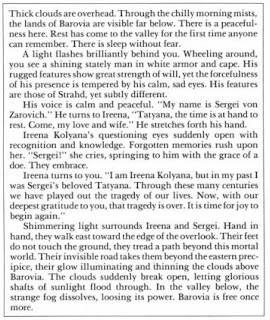Story Isn't the Enemy
 Among the many shibboleths of the Old School Renaissance, few are as enduring as the rejection of "story," "plot," and "narrative" in roleplaying games. These terms are often treated like contaminants, indicators that something has gone awry in a campaign or adventure. Speak of "story" without the usual ritual denunciations and you're liable to be accused of abandoning the principles of old school play.
Among the many shibboleths of the Old School Renaissance, few are as enduring as the rejection of "story," "plot," and "narrative" in roleplaying games. These terms are often treated like contaminants, indicators that something has gone awry in a campaign or adventure. Speak of "story" without the usual ritual denunciations and you're liable to be accused of abandoning the principles of old school play.I understand where this aversion comes from. Since the earliest days of this blog, I've often shared it. At the same time, I don't believe stories have no place in roleplaying games. However, like many others, my earliest experience as a roleplayer were from a time when attempts to inject "story," – by which I mean a deliberate, authorial structure of rising and falling action, dramatic turning points, and satisfying resolutions – were usually ham-fisted at best and outright railroads at worst.
There’s a reason why one of Grognardia’s most widely read (and most frequently argued about) posts is “How Dragonlance Ruined Everything.” The post touched a nerve because it spoke to something many of us experienced firsthand: modules and campaigns that confused narrative structure with narrative control. These were adventures where the outcomes were preordained, its dramatic beats carefully plotted, and the players expected to play along rather than play through. The referee, in such cases, became less an impartial adjudicator and more a frustrated novelist trying to drag the player characters through a plot that offered very little in the way of choice. Unsurprisingly, this left a bad taste in the mouths of those who cherished the open-ended freedom of the early days.
But here’s the thing: an emergent story is still story.
Take my House of Worms campaign for Empire of the Petal Throne. More than a decade of weekly play has produced a very detailed chronicle of events, consisting of actions taken, choices made, consequences endured, victories won, and, occasionally, defeats suffered. None of this was plotted out in advance. Most of it arose organically, through the interaction of player decisions, random tables, misread intentions, and lucky – or bad – rolls. Yet, looking back, I can trace arcs and patterns. I can recount the rise and fall of rivalries and the strange twists of fate that brought certain aspects of the campaign to greater prominence while others dropped away. I can talk about betrayals and reconciliations, discoveries and reversals. That’s a story. It may not be a tidy one. It may not resolve neatly – but it's a story nonetheless.
Too often, I think certain strands of OSR thought fails to acknowledge this and I don't exclude myself from this criticism. In rejecting plotted stories, we too quickly rejected the very idea of story itself. However, stories don’t have to be plotted. They don’t have to follow the Hero’s Journey. They don’t even need to have a central protagonist. They can simply emerge from play, from the piling up of decisions and consequences, the unpredictable results of dice rolls, and the slow evolution of characters over time. This is, in my view, one of the greatest strengths of the hobby.
Likewise, many classic modules – yes, even old school ones – contain what we might call a plot, even if it's implicit or only lightly sketched. A fortress inhabited by giants who've been raiding civilized lands is not just a list of rooms and monsters. It's a framework for conflict, danger, and mystery. It implies certain questions and challenges: Who are these giants? What do they want? Why are they raiding the lands of Men? These questions don’t force a narrative, but they do provide the raw material out of which one might grow. A good adventure isn’t inert; it suggests motion and consequence, even if it doesn’t prescribe them.
That’s where I think the OSR’s kneejerk hostility to “story” often goes astray. It’s an understandable overreaction, but an overreaction nonetheless. It’s shaped by the bad experiences of railroads, boxed text, and scripted scenes. However, in pushing back against those things, we risk throwing out something valuable. If we mistake any form of narrative structure for narrative imposition, we blind ourselves to one of the most powerful and rewarding aspects of roleplaying: the ability to discover a story in play, rather than impose one from above.
The truth is that most open-ended, player-driven campaigns do produce stories. Often, they’re some of the most compelling stories in gaming, precisely because no one saw them coming. They're not crafted to deliver a message or to hit emotional beats on cue. They arise naturally, shaped by the decisions of players and the impartial logic of dice. We should be able to recognize that without fear. Story isn’t the enemy; control is. Let the dice decide, let the players choose and the story will take care of itself.James Maliszewski's Blog
- James Maliszewski's profile
- 3 followers



